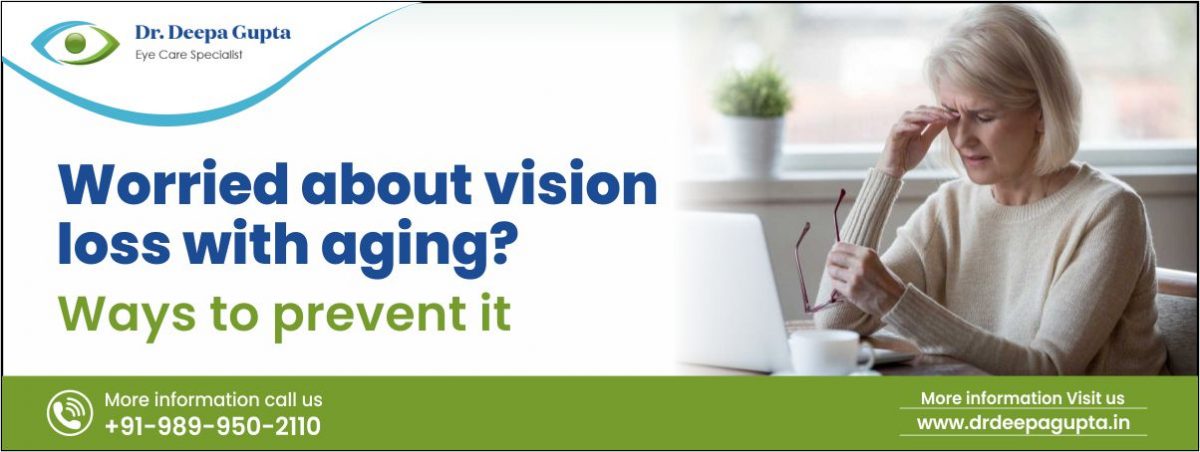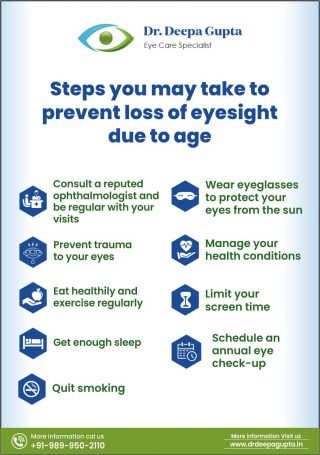
Vision problems due to aging
Aging is an inevitable process affecting all parts of your body and the eyes are no exception. It is very common to see changes in your eyesight and other eye-related issues in aging adults. Although it cannot be reversed, taking necessary precautions and getting the right treatment for your eyes at the right time can help to reduce the risk of many eye issues and vision loss.
Here in this article, we will throw some light on different ways to keep your eyes healthy and prevent vision loss due to aging. At Dr. Deepa Gupta eye care clinic you will receive all sorts of eye care consultations, advice, and customized treatment plans in accordance with your needs and wishes.
1. What are the common signs and symptoms of vision impairment due to aging?
- Blurry vision.
- Need more light to see well.
- Tired eyes and headaches while reading or doing some activity while keeping the objects close to the eyes.
- Difficulty seeing at night.
2. How can you prevent your impairment of eyes and vision loss due to aging?
Some of the steps you may take to prevent loss of eyesight due to age are:
- Consult a reputed ophthalmologist and be regular with your visits: A well-qualified and experienced eye doctor is very important for you to get the correct, timely, and personalized advice and treatment for your aging eyes. You must follow his/ her advice and instructions religiously and be regular with their visits.
Dr. Deepa Gupta’s clinic is a one-stop solution to all your eye problems as they provide treatment as and when needed for your eyes to aid them to be healthy and disease free.
Different services include:
- Prevent trauma to your eyes: Due to aging, the risk of losing balance and falling becomes common due to reduced muscle strength, lesser flexibility of the body, and less endurance during physical activities. Therefore, safety measures like anti-skid floors, grab bars, cushioning the sharp corners, securing unstable railings, and using support when needed is important to prevent the risk of traumatic injuries to the eyes.
- Eat healthily and exercise regularly: Consuming a balanced diet and regular exercise will help you to maintain a healthy weight and prevent the development of ailments like diabetes, high blood pressure, etc can also affect your eyes.
- Get enough sleep: Our eyes replenish themselves through continuous lubrication and clear the allergens, dust, and smoke from the eyes while we are asleep. Proper sleep is also essential for emotional and mental well-being which in turn also keeps your eyes healthy and prevents vision impairment.
- Quit smoking: Research has shown that smoking increases the risk of developing cataracts and age-related macular degeneration which negatively affects your vision. So stop smoking and maintain healthy eyes.
- Wear eyeglasses to protect your eyes from the sun: Protecting your eyes from the harmful effects of UV rays of the sun is necessary to prevent the risk of developing eye cancers and other eye problems like cataracts. Always wear sunglasses with 100 percent UV protection and wide hats to protect against these damaging eye conditions.
- Manage your health conditions: Take care of your overall health and get your health issues treated in time which may also have a negative effect on your eyes like diabetes can lead to diabetic retinopathy, high blood pressure, heart problems, etc. may lead to vision problems.
- Limit your screen time: Excessive screen time can result in straining your eyes and blurring your vision. Lessen your time on the screen and take short breaks in between to reduce exerting your eyes and keep them in good health.
- Schedule an annual eye check-up: Certain eye conditions may not show any symptoms until very late stages, therefore seeing your ophthalmologist at regular intervals, even when you do not experience any eye problems can go a long way in keeping your eyes disease-free and preventing eye vision due to aging.
3. When should you immediately see an ophthalmologist and not delay his/her visit?
Although regular eye check-up visits play a vital role to maintain your eye health, there are certain conditions where you must seek your ophthalmologist’s help immediately because any delay may result in permanent irreversible damage to your eyes:
- Sudden change in your vision.
- If you see flashes of light.
- Double vision.
- Redness or swelling around your eye or eyelid.
Although regular eye check-up visits play a vital role to maintain your eye health, there are certain conditions where you must seek your ophthalmologist’s help immediately because any delay may result in permanent irreversible damage to your eyes:
- Sudden change in your vision.
- If you see flashes of light.
- Double vision.
- Redness or swelling around your eye or eyelid.
4. Where can you find the best ophthalmologist in Delhi NCR for preventing vision loss due to aging?
Visit Dr. Deepa Gupta’s eye care center for the highest quality eye treatment with outstanding results. Homed by one of the best and most qualified doctors and staff, you will receive the best solutions to all your eye-related issues in a safe and comfortable environment. To further facilitate accuracy and precision in the treatment, Dr. Deepa’s clinic is equipped with the latest and modern equipment. Consult Dr. Deepa Gupta’s clinic today and experience the best eye health at reasonable costs.

